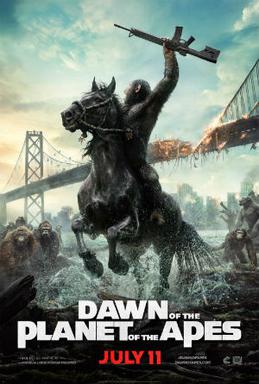In a recent interview with Thompson on Hollywood, Reeves reveals how Rise of the Planet of the Apes would be a great inspiration to his work on the new movie:
"Watching “Rise” it was miraculous how connected we are emotionally to him. I’ve never seen it at that level. We’re wrapped up in his character. I wanted to carry that forward. When I rewatched “Rise” in the interim, I had a son, and something in watching Caesar come into being in that movie reminded me of my son. When you watch you identify with Caesar. I couldn’t believe I had that level of emotional involvement with a CG character. He is torn away from his family and grows up with another family, he’s taken away from them and imprisoned in the ape habitat. There’s no dialogue except sign language and it’s fascinating and emotionally involving. It felt like an uncanny connection to Andy’s perspective. I wanted to make sure that the emotional life of Caesar was the way the story carried forward. You have to make Caesar’s movie, you have to think about what matters to him the most … When I got involved the story initially took place further down the line, the apes had evolved fast. What excited me was the idea of going back to finding a way to get on the path, I did not want to jump so far ahead. I restarted the first movie that put you in the heart of the apes, knowing that in the canon, the ’68 movie I saw as a kid, you know what that world is about. That was the beginning. So this leads to the original film. How does that work? That is where it’s going. I did not want to go too far and miss how it developed."
He also cited some plot elements for the movie. Some of them may be considered very mild spoilers:
"Caesar talks at the end of the movie, he has some level of speech. I wanted to make sure we’re continuing to go along the path of evolution without missing it, it was so delicious to watch in the first movie. It’s not like now they are talking in verse. Hopefully the movie is emotional and thrilling as you watch the apes come into being … The ape civilization is in the woods, between Vancouver and New Orleans, the world after what happens with the simian virus flu. The two main locales are San Francisco and the Muir Woods where the ape civilization is born. We’ll be doing a little shooting in San Francisco as well. A lot of the Louisiana shooting was to build huge wood sets outside in the woods to add realism, enormous exterior streets. We’re shooting in the rain, in the wind, all on location out in the open in the elements."
Reeves also commented on the scale of the film:
"The crazy thing is the giant scale of this film, which is enormous for any movie, so much bigger. The only way it works is from an emotional intimate point-of-view. It has all the things that drive me to do something, an emotional core, as Andy, Rupert and Weta did on “Rise”: How do you become an ape? How emotional it is, the emotional intimacy. It’s a huge adjustment. It’s not only on a scale for me that is obviously larger than anything I’ve done, but huge for any film in this particular way: this is the first movie at this level to do native 3-D on an enormous canvas and mo-cap that is 95 % shot on location. The mo-cap shooting on the first movie was done really on the stage. It’s enormous do this in a naturalistic space. And it’s an exciting learning curve."
Finally, Reeves makes note on Serkis’ knack for mo-cap acting:
"Andy is a great actor, it comes down to that. The first thing I did, I wanted the VFX people to take me through all the footage on the last movie before and after of Andy so I could understand what he was doing. I was so impressed, we all know he’s a genius. I wanted to get under the hood, and they showed some minutes in scenes with even more going on, I’m hoping to pull those things out."
Reeves looks like he does intend to follow on where Rupert Wyatt left off in the last movie, and I'm not just talking story-wise, but tone, style, drama, and discipline-wise as well. Let's hope to see a new Apes movie as great as the last one.



No comments:
Post a Comment